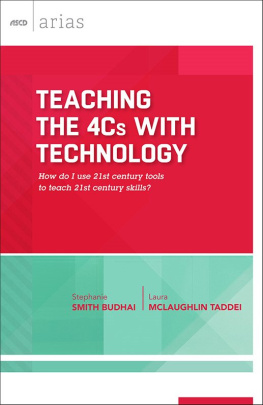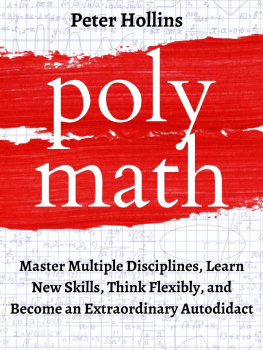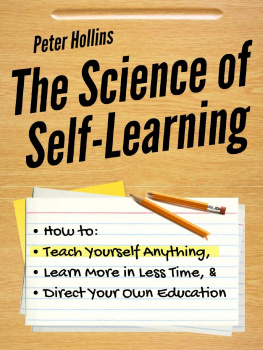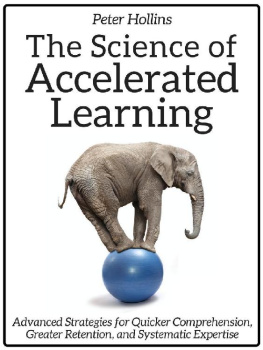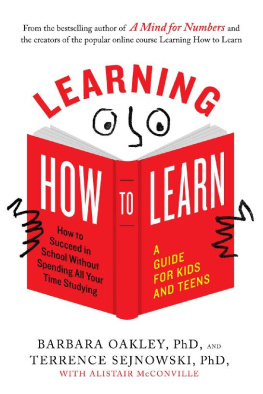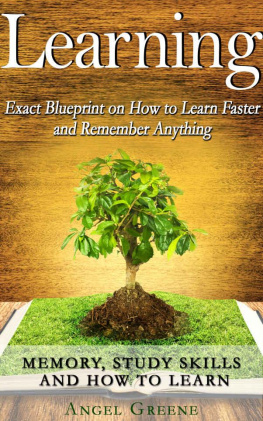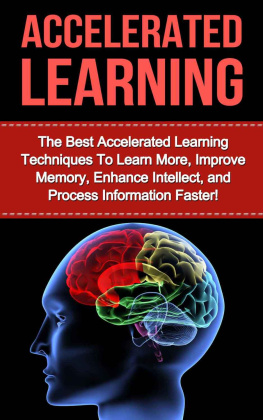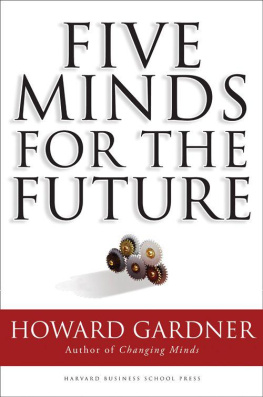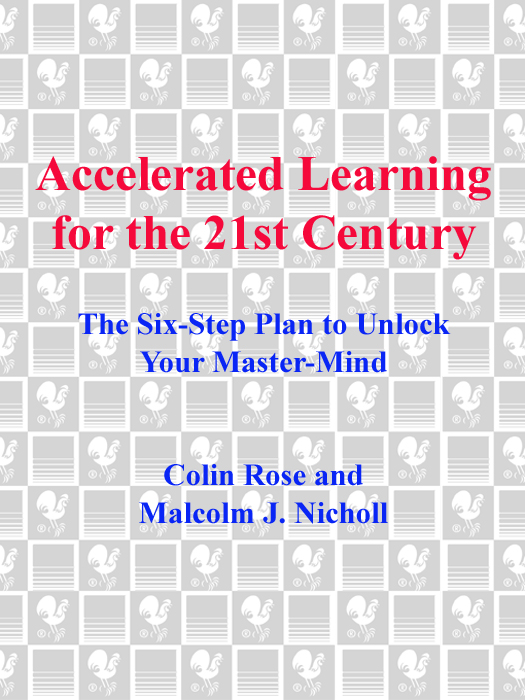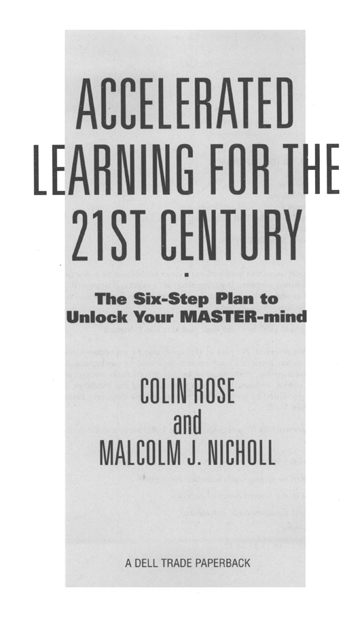NEVER MEMORIZE PAGES OF NOTES AGAIN.
DONT SIT AT A DESK STUDYING FOR HOURS.
WHY?
THESE METHODS DO NOT WORK.
DISCOVER THE ONES THAT DO.
Most people use only a tiny fraction of their brains capacity, not because they dont have the intelligence, but because they have never been taught how to access and develop their innate abilities. This remarkable book brings you an approach to learning thats custom-made for your own unique brain. Plus, it utilizes all the scientific breakthroughs that make learning easier and astoundingly faster. Find out why the experts say:
Accelerated Learning for the 21st Century is essential reading for everyone interested in improving their ability to learn. Students of all ages as well as teachers and corporate trainers will find a wealth of life-transforming practical information.
Sir Christopher Ball, director of learning,
Royal Society for the Encouragement of Arts,
Manufactures, and Commerce
A significant work, full of valuable information every adult, educator, parent, and student needs to know today for a successful future.
Bobbi DePorter, author of Quantum Learning
and Quantum Business
Excellent! Worth more than a boxcar full of conventional textbooks in psychology of learning or psychology of education. No contest.
David L. Quinby, psychology emeritus professor,
Youngstown State University
WORK WITH YOUR BRAINS NATURAL PROCESSES,
BOOST YOUR INTELLIGENCE,
AND LEARN HOW TO LEARN, WITH
ACCELERATED LEARNING FOR THE 21st CENTURY
A DELL TRADE PAPERBACK
Published by
Dell Publishing
a division of
Bantam Doubleday Dell Publishing Group, Inc.
1540 Broadway
New York, New York 10036
Copyright 1997 by Colin Rose and Malcolm J. Nicholl
All rights reserved. No part of this book may be reproduced or transmitted in any form or by any means, electronic or mechanical, including photocopying, recording, or by any information storage and retrieval system, without the written permission of the Publisher, except where permitted by law. For information address Delacorte Press, New York, New York.
The trademark Dell is registered in the U.S. Patent and Trademark Office.
eISBN: 978-0-307-80760-1
Reprinted by arrangement with Delacorte Press
v3.1
Contents
Introduction
The empires of the future will be the empires of the mind.
S IR W INSTON C HURCHILL
- The world is changing at an ever-accelerating pace.
- Life, society, and economics are becoming ever more complex.
- The nature of work is radically altering.
- Jobs are disappearing at an unprecedented rate.
- It is an age of uncertainty.
- The past is less and less a guide to the future.
These are the defining characteristics of the final turbulent years of this millennium. These are the challenges that need to be met by parents, educators, businesses, and governments.
Success in the 21st century will primarily depend upon the extent to which we and our children develop the appropriate skills to master each of the interconnected forces of speed, complexity, and uncertainty. It is in our hands.
The speed at which the world is changing demands a matching ability to learn faster. The increasing complexity of the world demands a matching ability to analyze situations logically and solve problems creatively.
Accelerated Learning for the 21st Century gives you the essential core skills of learning fast and thinking creatively. In that sense it is a personal how-to book.
But it is more than that. This book also lays out some key recommendations: how we can, and how we must, significantly improve the way we educate. As a society we urgently need a huge increase in the numbers of people who can be described as highly educated. We are doing a pretty good job of educating a minority. We must extend that trait to the majority.
Whether you have school-age children or not, this subject is of immediate and vital importance to you. It affects you as a taxpayer, as a citizen, and as a member of the workforce.
The worthwhile jobs of the future will either be jobs of the mind or jobs requiring a finely tuned talentin the worlds of music, art, or sport, for instance. Repetitive, mechanical jobs are either being taken over by computer-controlled machines or exported to overpopulated countries where people are prepared to work for lower wages and where their governments offer incentives to business. There simply wont be any work for inadequately educated people.
Even if you do have a mind job, it is still your concern. Unless the whole educational standard of our nation is vastly raised, you will suffer higher taxes, lower national economic output, and the costs of social disruption.
Low educational attainment and poor analytical and decision-making skills lead to economic dependency. You will encounter higher taxes in the future because a nation comprising mostly people who cant function in a high-tech world will mean higher unemployment benefits, higher welfare costs, and higher crime-control costs. And even higher health-care costsbecause there is a clear correlation between educational status and health. Studies show that people with higher education are generally healthier and live longer.
Looked at positively, the wealth of our nation is the sum of the brains of its peopletheir creativity and skills. In other words, our best asset is our collective ability to learn fast and adapt thoughtfully to situations we cant predict.
At the moment, though, the focus of schools is on deciding what children should learn and what they should think.
We will argue that in a time of such rapid change, the first priority is to teach our children how to learn and how to think.
Only with these two super skills can you cope with change and complexity and become economically independentand employable in the 21st century. Only then have you the core skills for personal happiness, stable relationships, and growth. Your ability to earn is directly proportional to your ability to learn.
So, to the extent that you want to live in a flourishing, safe, optimistic, and creative society, you need to be very concerned indeed with what goes on in our schools. Whether you are a parent of a school-age child or not. It is everyones concern.
A LIFELONG ADVENTURE
Learning is not just knowing the answers. Its not just acquiring bits and pieces of general knowledge. It cant simply be measured by grades and exam results. Its not just taking on board what other people know.
Learning is a lifelong adventure. Its a never-ending voyage of exploration to create your own personal understanding. And it crucially must involve the ability to continuously analyze and improve upon the way in which you learn. The ability to be conscious of the process of your own learning and thinking. Learning must begin much earlier than the childs first day at school and it must continue well into retirement. We must never stop learningand implementing what we learn.
What are the implications? We need to make changesurgently. We need to help all parents create a rich, stimulating, thought-provoking home environment in the preschool years. Studies show that 50 percent of ones potential brain capacity is developed in the first five or six years of life. Doesnt it make sense, therefore, that a concerted effort should be made to turn those early years into a funyet powerfullearning and growth experience?


